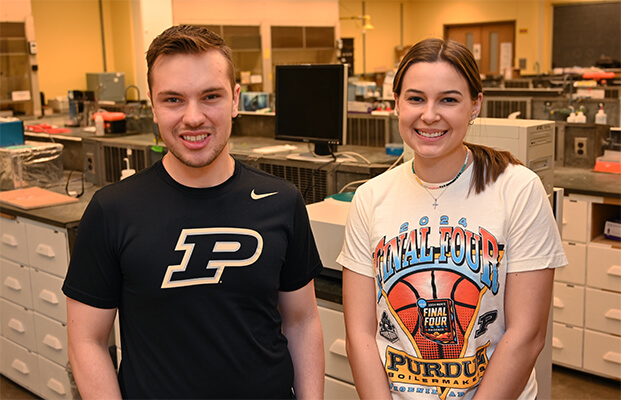Analytical chemistry graduate students land highly competitive fellowships to fund electrochemistry research
2024-04-25
Writer(s): Steve Scherer

Purdue Chemistry graduate students Brady Layman and Megan Hill.
Two Department of Chemistry graduate students have been awarded prestigious national fellowships to continue their chemistry graduate research.
Brady Layman was selected for two highly competitive awards: the National Defense Science and Engineering Graduate (NDSEG) Fellowship and the National Science Foundation Graduate Research Fellowship Program (NSF GRFP).
Megan Hill was awarded the selective University Nuclear Leadership Program (UNLP) Fellowship funded by the Department of Energy's (DOE) Office of Nuclear Energy.
Both are graduate students in Professor Jeffrey Dick’s electrochemistry lab where the group specializes in making the immeasurable measurable.
Layman will apply NDSEG funding to continue his investigation of complex microdroplet samples using electrochemiluminescence (ECL).
“I produce photons out of my reactions, without the need for incoming light into the systems. So, when I’m doing an experiment, I’m in total darkness,” explained Layman, a second-year graduate student from Gresham, Oregon.
Through a combination of electrical and chemical reactions, photons ‘light up’ Layman’s ECL emulsion samples allowing him to manipulate and study microdroplet reactions at the nanoscale.
Jeffrey Dick, Richard B. Wetherill Associate Professor of Chemistry, says the goal is to study whether the chemistry is different within these tiny volumes, along with developing measurement tools to analyze single droplets, one at a time.
“What Brady is doing is finding ways of generating light using electricity on a conductive interface to give us information about the curious chemistry occurring in and around those tiny volumes,” Dick explained.

Chemistry graduate student Brady Layman uses an optical microscope and a scanning electrochemical microscope in Professor Jeffrey Dick's electrochemistry lab located inside Purdue University's Brown Laboratory building.
A core focus of Professor Dick’s research group is the development of new electrochemical tools and methods to study chemistry in environments that are otherwise nearly impossible to study.
Megan Hill will apply her UNLP funding to forge new microscale electroanalytical measurement techniques to advance nuclear fuel reprocessing.
“Electrochemistry is critical for solving a lot of our future energy needs, and my ultimate goal in graduate school is to do research that helps make nuclear fuel more sustainable. One way to reprocess nuclear fuel is through pyroprocessing,” said Hill, a first-year graduate student from San Diego, California.
Pyrochemical reprocessing separates actinides, such as uranium and plutonium, from used nuclear fuel using a series of electrochemical operations in high-temperature molten salts.
“A big portion of Megan’s proposal is developing the tools we commonly use in electrochemistry now and adapting them to be used in high-temperature environments that can sometimes exceed 800°C. So, there will need to be quite a bit of innovation to make highly quantitative measurements in these environments,” explained Dick.

Chemistry graduate student Megan Hill uses a glove box in Professor Jeffrey Dick's electrochemistry lab located inside Purdue University's Brown Laboratory building.
Hill’s UNLP fellowship provides three years of funding to support graduate research relevant to nuclear energy and includes an internship at a DOE national laboratory.
Layman’s NDSEG fellowship, sponsored by the U.S. Department of Defense, provides funding for three years, covering full tuition and all mandatory fees along with a monthly stipend and travel funding for professional development.
About Analytical Chemistry at Purdue
Housed in the Department of Chemistry in the College of Science, Purdue University’s analytical chemistry program is ranked No. 1 in the latest U.S. News & World Report graduate program. The Purdue program also remains one of the world’s largest, with 16 faculty members and more than 100 graduate students.